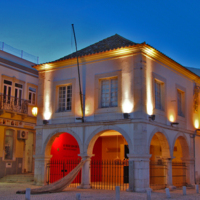1 result
Legacies on Display: Slavery in Museums
Museums are exciting places to see the usable past in action. They bring together objects, people and places to provide interpretation and facilitate discussions on a range of topics, from history to human rights. There is a global tradition of museums representing slavery beginning in the early twentieth century. These museums range from small, local community museums in the UK, that focus on individual abolitionist leaders, to redeveloped slave forts on the West African coast and large national institutions in North America. As well as providing visitors with information about slavery, both historic and modern, museums can also provide evidence as to how societies are thinking about these issues.
This collection showcases museums across the world that house permanent exhibitions relating to slavery and abolition.

Mercado de Escravos
The Mercado de Escravos (or Slave Market Museum) is situated in the center of Lagos on the site of a fifteenth-century slave market, believed to have been the first in Europe. The museum building itself was built in the seventeenth century on the remains of the market, first as the Royal Overseer's…